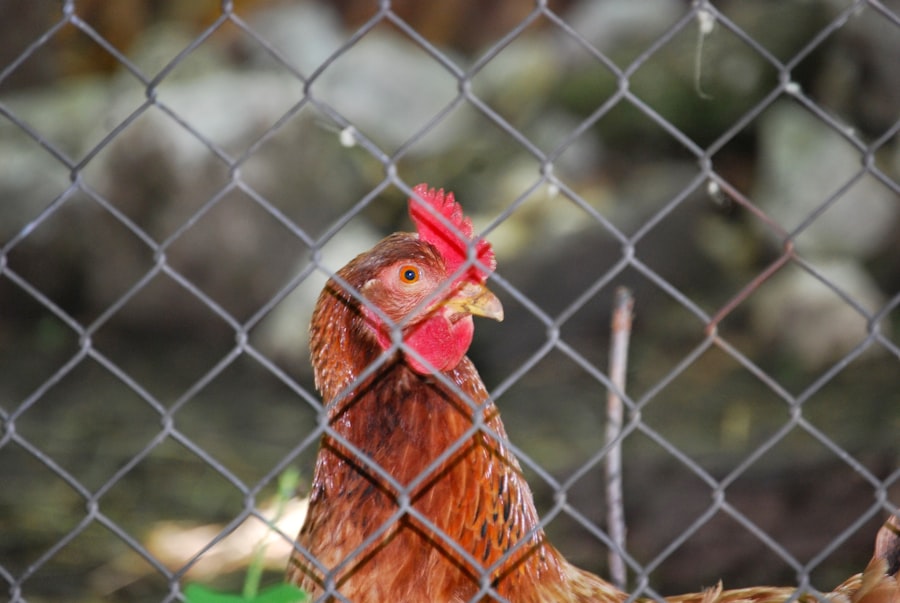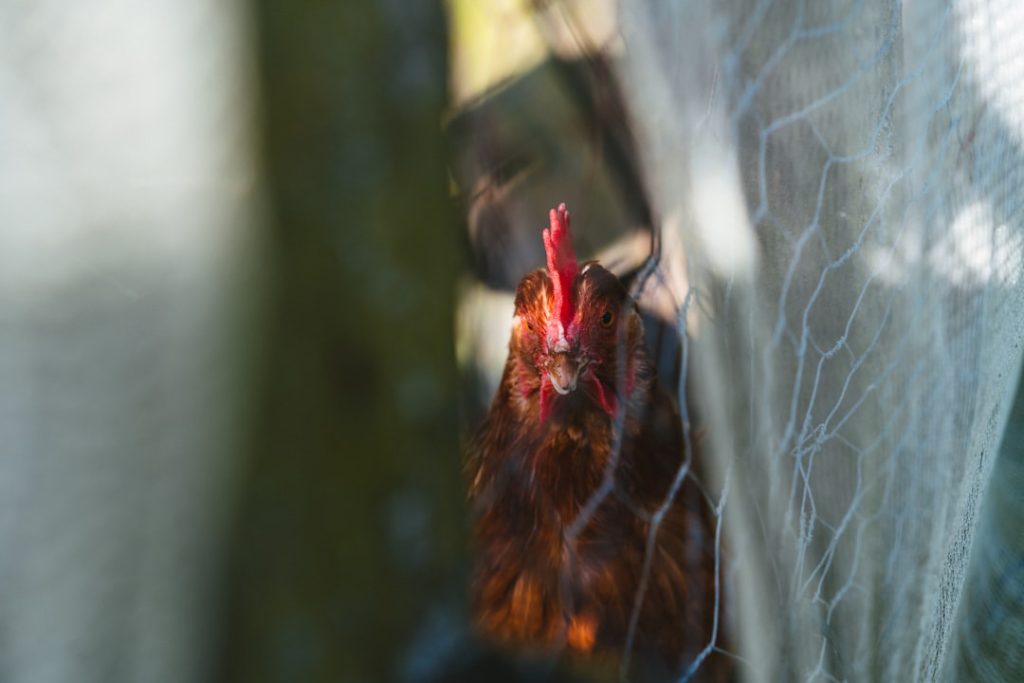Chickens can be beneficial additions to backyards, offering fresh eggs, natural pest control, and entertainment. However, they can also cause significant damage to gardens if not properly managed. As natural foragers, chickens instinctively peck and scratch at the soil, which can harm plants, flowers, and vegetables.
Their scratching behavior can uproot young plants and disrupt soil structure, making it difficult for gardeners to maintain their plots. Chickens are particularly fond of fresh greens and will consume tender shoots and leaves, potentially destroying a gardener’s hard work. The impact of chickens on gardens extends beyond plant damage.
They can also affect landscaping features such as mulch, decorative stones, and irrigation systems. Their scratching and pecking can displace mulch and stones, creating an untidy appearance. Chickens may inadvertently damage irrigation systems by pecking at hoses or digging around sprinkler heads, potentially leading to water waste and compromising overall garden health.
Gardeners who wish to keep chickens while maintaining their green spaces must understand and mitigate these potential impacts to strike a balance between the benefits of chicken-keeping and garden preservation.
Table of Contents
- 1 Creating physical barriers: Fencing and netting to keep chickens out
- 2 Implementing deterrents: Natural and humane methods to discourage chickens
- 3 Utilizing repellents: Chemical and organic options for keeping chickens away
- 4 Designing alternative spaces: Providing a dedicated area for chickens to roam
- 5 Training and supervision: Teaching chickens to avoid the garden
- 6 Seeking professional help: Consulting with experts for long-term solutions
- 7 FAQs
- 7.1 What are some effective ways to keep chickens off the garden?
- 7.2 Why is it important to keep chickens off the garden?
- 7.3 Are there any humane methods to keep chickens off the garden?
- 7.4 What are some natural deterrents to keep chickens off the garden?
- 7.5 How can I create a designated area for chickens to roam and forage?
Key Takeaways
- Chickens can have a negative impact on gardens by scratching, pecking, and eating plants.
- Fencing and netting are effective physical barriers to keep chickens out of gardens.
- Natural deterrents like predator decoys and motion-activated sprinklers can discourage chickens from entering gardens.
- Chemical and organic repellents such as garlic spray and citrus peels can be used to keep chickens away from gardens.
- Providing a dedicated area for chickens to roam can help minimize their impact on gardens.
Creating physical barriers: Fencing and netting to keep chickens out
Fencing: A Sturdy Barrier
Installing a sturdy fence around the perimeter of the garden can help prevent chickens from gaining access to the area. Chicken wire or hardware cloth can be used to create a secure barrier that is difficult for chickens to breach.
Burying and Heightening the Fence
It’s important to bury the bottom of the fence several inches into the ground to prevent chickens from digging underneath it. Additionally, adding a few feet of height to the fence can deter chickens from attempting to fly over it.
Netting: A Protective Cover
Another option is to use netting to cover vulnerable areas of the garden, such as raised beds or newly planted seedlings. Netting can be draped over the top of these areas to create a barrier that prevents chickens from reaching the plants below. It’s essential to secure the netting tightly to prevent chickens from getting underneath it.
Maintenance is Key
While physical barriers can be effective in keeping chickens out of the garden, it’s important to regularly inspect and maintain them to ensure their continued effectiveness.
Implementing deterrents: Natural and humane methods to discourage chickens

In addition to physical barriers, there are several natural and humane methods that can be implemented to discourage chickens from entering the garden. One effective deterrent is the use of motion-activated sprinklers. These devices are equipped with sensors that detect movement and then release a burst of water, startling and deterring any chickens in the area.
Motion-activated sprinklers are a non-harmful way to discourage chickens from entering the garden while also providing a source of irrigation for plants. Another natural deterrent is the use of predator decoys or scare devices. Placing decoys such as fake owls or hawks in the garden can create the illusion of a predator presence, causing chickens to avoid the area.
Additionally, hanging shiny objects such as aluminum foil strips or old CDs can create movement and reflection that may startle chickens and keep them away from the garden. These methods are non-invasive and provide a gentle way to discourage chickens from causing damage in the garden.
Utilizing repellents: Chemical and organic options for keeping chickens away
For gardeners looking for additional options to keep chickens away from their gardens, there are various repellents available that can be used as a deterrent. Chemical repellents such as commercial sprays or powders can be applied to specific areas of the garden to discourage chickens from foraging or pecking. These repellents often contain ingredients that are unappealing or irritating to chickens, causing them to avoid treated areas.
It’s important to follow the manufacturer’s instructions when using chemical repellents and to avoid applying them directly to edible plants. Organic options for chicken repellents include natural substances such as garlic, vinegar, or hot pepper spray. These substances can be mixed with water and sprayed onto plants or soil to create an unappealing scent or taste for chickens.
Additionally, planting aromatic herbs such as lavender, rosemary, or mint around the perimeter of the garden can help deter chickens with their strong scents. Utilizing repellents can provide an additional layer of protection for gardens while also being mindful of the environment and the well-being of the chickens.
Designing alternative spaces: Providing a dedicated area for chickens to roam
One long-term solution for keeping chickens out of the garden is to provide them with a dedicated space where they can roam and forage without causing damage. Designating a specific area of the yard for chickens can help minimize their impact on gardens while still allowing them to enjoy freedom and exercise. This area can be enclosed with fencing or netting to create a secure space for chickens to explore without posing a threat to the garden.
In addition to providing a designated space for chickens, it’s important to ensure that they have access to plenty of food, water, and enrichment activities in their designated area. This can help keep them occupied and satisfied, reducing their desire to venture into the garden in search of food or entertainment. By designing alternative spaces for chickens to roam, gardeners can create a harmonious environment where both plants and poultry can thrive.
Training and supervision: Teaching chickens to avoid the garden

Positive Reinforcement Training
One successful method of training involves using positive reinforcement techniques. By offering treats or praise when chickens stay away from the garden, you can help them associate this behavior with positive experiences. This approach encourages chickens to develop good habits and avoid areas you want to protect.
Supervision: The Key to Prevention
Supervision is equally important in managing chicken behavior around the garden. By keeping a watchful eye on their activities and intervening when necessary, you can prevent chickens from causing damage to your garden. This may involve gently redirecting them away from vulnerable areas or providing alternative sources of entertainment and enrichment in their designated space.
Establishing Boundaries and Promoting Positive Behavior
With patience and consistency, training and supervision can help establish clear boundaries for your chickens while promoting positive behaviors. By setting these boundaries, you can enjoy a harmonious coexistence with your backyard chickens and protect your garden from potential damage.
Seeking professional help: Consulting with experts for long-term solutions
For gardeners who are struggling to keep chickens out of their gardens, seeking professional help may be necessary to find long-term solutions. Consulting with experts such as poultry behaviorists or experienced chicken keepers can provide valuable insights and guidance on managing chicken behavior in a backyard setting. These professionals can offer personalized advice based on the specific challenges and dynamics of each garden, helping gardeners develop effective strategies for keeping chickens at bay.
In some cases, professional assistance may involve implementing more advanced techniques such as behavior modification or environmental enrichment for chickens. This could include creating stimulating environments within their designated space or introducing new activities and toys to keep them engaged and content. By seeking professional help, gardeners can gain access to specialized knowledge and resources that can support them in creating a harmonious coexistence between chickens and gardens.
In conclusion, managing the impact of chickens on gardens requires a multifaceted approach that combines physical barriers, deterrents, repellents, alternative spaces, training, supervision, and professional guidance. By understanding the behaviors and needs of chickens, gardeners can develop strategies that protect their gardens while also promoting the well-being of their feathered friends. With careful planning and consistent effort, it’s possible to create a balanced environment where both gardens and chickens can thrive together harmoniously.
If you’re looking for ways to keep chickens off your garden, you may also be interested in learning about the best flooring options for a chicken coop. Check out this article on choosing the right floor for your chicken coop to ensure that your feathered friends have a comfortable and clean living space while also keeping them away from your garden.
FAQs
What are some effective ways to keep chickens off the garden?
Some effective ways to keep chickens off the garden include using physical barriers such as fences or chicken wire, using natural deterrents like citrus peels or coffee grounds, and providing designated areas for the chickens to roam and forage.
Why is it important to keep chickens off the garden?
It is important to keep chickens off the garden to protect the plants from being trampled, scratched, or eaten by the chickens. Additionally, chicken droppings can introduce bacteria and pathogens to the garden soil, posing a risk to human health.
Are there any humane methods to keep chickens off the garden?
Yes, there are humane methods to keep chickens off the garden, such as providing alternative areas for the chickens to forage, using natural deterrents, and training the chickens to stay away from the garden through positive reinforcement.
What are some natural deterrents to keep chickens off the garden?
Some natural deterrents to keep chickens off the garden include citrus peels, coffee grounds, cayenne pepper, and garlic. These items can be scattered around the garden to discourage chickens from entering.
How can I create a designated area for chickens to roam and forage?
You can create a designated area for chickens to roam and forage by using chicken wire or electric fencing to enclose a specific area of your yard. This area can be equipped with a shelter, food and water sources, and natural elements for the chickens to explore.
Meet Walter, the feathered-friend fanatic of Florida! Nestled in the sunshine state, Walter struts through life with his feathered companions, clucking his way to happiness. With a coop that’s fancier than a five-star hotel, he’s the Don Juan of the chicken world. When he’s not teaching his hens to do the cha-cha, you’ll find him in a heated debate with his prized rooster, Sir Clucks-a-Lot. Walter’s poultry passion is no yolk; he’s the sunny-side-up guy you never knew you needed in your flock of friends!







